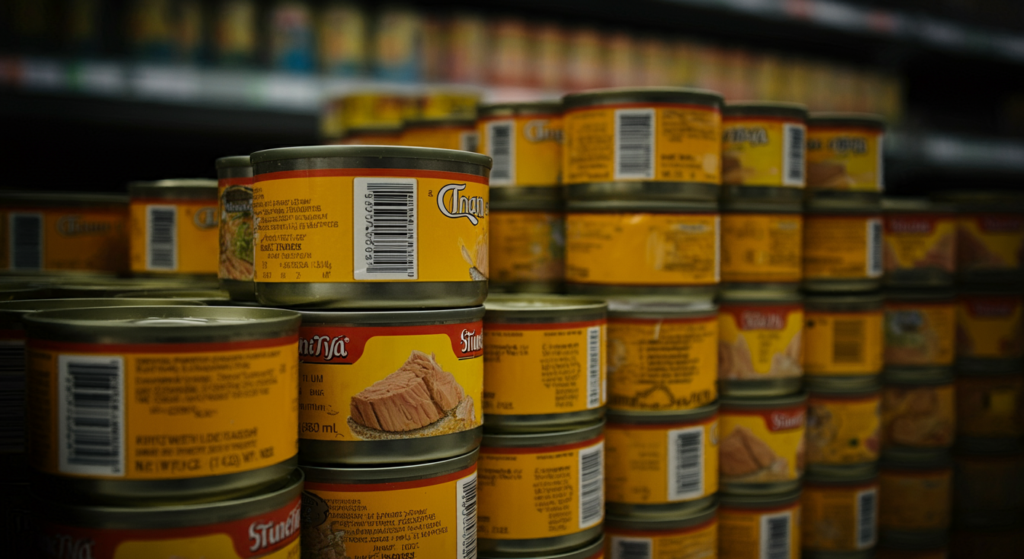Can dogs eat tuna?
Tuna and Tails: Snack Time or Trouble?
As responsible dog owners, we’re always mindful of what’s safe for our four-legged friends to eat. With so many human foods posing potential risks to dogs, it’s only natural to scrutinise items from our own diets. Tuna—a seafood favourite and a globally beloved ingredient—often raises the question: “Can dogs eat tuna?” While it’s a healthy option for humans, does it hold the same benefits for our canine companions? Exploring this topic can help you make informed decisions about what to share with your pet.
Yes, dogs can eat tuna, but only under specific conditions. When served plain, cooked, and in moderation, tuna is safe for dogs and may even provide some health benefits. However, not all tuna is dog-friendly. Factors like preparation, portion size, and mercury levels are important to consider when deciding whether to offer this treat to your pet. Let’s dive deeper to ensure you’re making the best choice for your dog’s health.
Table of Contents

What Is Tuna?
Tuna is a large, migratory fish found in oceans worldwide. Popular species include albacore, skipjack, and bluefin. Tuna is prized for its rich flavour, high protein content, and healthy omega-3 fatty acids. It’s a common ingredient in both fresh and canned forms, often used in salads, sandwiches, and sushi.
In human cuisine, tuna is frequently seasoned or canned with oil, salt, or other additives. These enhancements may make tuna less suitable for dogs. Understanding the differences in preparation is crucial before sharing tuna with your pet.
Can Dogs Eat Tuna?
The simple answer is yes, dogs can eat tuna, but only in moderation and under certain conditions. When served plain, cooked, and unseasoned, tuna can provide health benefits. It’s rich in omega-3 fatty acids and protein, which contribute to a shiny coat and strong muscles.
However, not all tuna is created equal. Can dogs eat canned tuna? Yes, but only if it’s packed in water and free from added salt or flavourings. Fresh, cooked tuna is also safe, provided it’s served without any seasonings or oil.
What Are the Benefits of Tuna for Dogs?
Tuna, when prepared correctly and offered in moderation, can provide certain benefits to your dog. While not essential to a dog’s diet, it contains nutrients and compounds that may support your pet’s overall health. Here are some potential benefits of tuna for dogs:
- Rich in Omega-3 Fatty Acids Tuna is an excellent source of omega-3 fatty acids, which can contribute to a shiny coat, healthy skin, and reduced inflammation. These fatty acids also support joint health and cardiovascular function.
- High-Quality Protein Tuna is packed with protein, an essential nutrient for muscle development and repair. Protein also helps maintain energy levels and overall vitality.
- Supports Brain Health The omega-3 fatty acids in tuna may play a role in promoting brain health, particularly in older dogs. These nutrients could help reduce inflammation and support cognitive function as your pet ages.
- Provides Essential Nutrients Tuna contains small amounts of vitamins and minerals, such as:
- Vitamin B12: Supports red blood cell formation and neurological health.
- Selenium: An antioxidant that protects cells from damage.
- Potassium: Helps maintain proper muscle and nerve function.
- May Aid in Weight Management The high protein content in tuna can help your dog feel fuller for longer, potentially aiding in weight management when used as an occasional treat.
Are There Risks to Feeding Tuna to Dogs?
While tuna offers some benefits, it also comes with potential risks. These include:
Mercury Content Tuna is a large fish that accumulates mercury over its lifetime. High mercury levels can be harmful to dogs, potentially causing neurological issues. Smaller species like skipjack have lower mercury levels than larger ones like albacore or bluefin. Tip: Limit tuna to an occasional treat and avoid feeding large quantities.
Digestive Upset Even plain tuna can upset a dog’s stomach if consumed in large amounts. Symptoms may include:
- Diarrhoea
- Vomiting
- Bloating or gas
High Sodium Content in Canned Tuna Many canned tunas are packed in brine or oil, making them high in sodium. Excessive sodium can lead to:
- Dehydration
- High blood pressure
- Kidney problems Tip: Always choose tuna packed in water with no added salt.
Allergic Reactions Though rare, some dogs may be allergic to tuna or other fish. Signs of an allergic reaction include:
- Itching or scratching
- Swelling of the face or paws
- Difficulty breathing Tip: Introduce tuna slowly and monitor your dog for any unusual reactions.
Bones Fresh tuna may contain small bones that pose a choking hazard or could injure your dog’s digestive tract. Always ensure the fish is thoroughly deboned before serving.

Final Thoughts
While tuna is not toxic to dogs, the risks often outweigh the benefits if it’s not prepared properly. Always serve plain, cooked, and boneless tuna in moderation. Avoid canned tuna packed in oil, brine, or with added seasonings. If your dog accidentally consumes large amounts of tuna or displays symptoms of mercury poisoning, contact your veterinarian immediately.
How Much Tuna Can Dogs Eat?
Portion control is key when feeding tuna to dogs. A small dog may tolerate a tablespoon of tuna, while larger breeds might enjoy a few more bites. Introduce tuna gradually to observe any adverse reactions, such as allergic responses or digestive issues.
If your dog shows signs of discomfort after eating tuna, consult your veterinarian immediately. They can provide guidance on whether tuna is a suitable treat for your specific dog.
Fun Facts About Dogs and Tuna
- Some dogs love the rich flavour of tuna, while others are indifferent. If your dog enjoys tuna, treat them sparingly!
- Did you know tuna has been part of human diets for thousands of years? While dogs don’t need tuna, they can enjoy it as an occasional treat.
Conclusion
So, can dogs eat tuna? The answer is yes—with precautions. Always serve plain, cooked, and boneless tuna in moderation. Avoid canned tuna with added salt, oil, or flavourings, and consult your vet if you’re unsure. Remember, your dog’s health and safety come first. Have you tried giving your dog tuna? Share your experience below!

FAQ: Can Dogs Eat Tuna?
Can dogs eat canned tuna in water?
Yes, dogs can eat canned tuna in water in small amounts. It’s a better option than tuna in oil or brine because it contains fewer additives and fats.
Can dogs eat tuna with mayo?
It’s not recommended. Mayonnaise contains fats and seasonings that can be unhealthy for dogs, especially if consumed regularly.
Can I mix tuna with dog food?
Yes, you can mix plain, unseasoned tuna with dog food occasionally as a treat. Ensure it’s free of added oils, salt, or seasonings.
Can dogs eat tuna in oil?
Tuna in oil is not ideal for dogs as the oil adds unnecessary fat to their diet, which can lead to digestive upset or weight gain.
Is tuna safe for dogs in the UK?
Yes, tuna is safe for dogs in the UK when served in moderation and without harmful additives like salt, oil, or seasoning.
Can dogs eat tuna steak?
Yes, dogs can eat tuna steak as an occasional treat, but it should be cooked, unseasoned, and given in small portions due to its high mercury content.
Can dogs eat tuna with rice?
Yes, plain tuna and rice can be a safe and simple meal for dogs, but it should not replace a balanced diet designed for canine nutrition.
Can dogs eat tuna in sunflower oil?
Tuna in sunflower oil should be avoided because the oil adds extra fat that is unnecessary for dogs and may cause stomach upset.
Can dogs eat salmon instead of tuna?
Yes, salmon is often a safer and healthier alternative to tuna as it has lower mercury levels. Make sure it’s cooked and free of bones.
Can dogs eat sardines?
Yes, sardines are a great option for dogs because they are small, low in mercury, and packed with beneficial omega-3 fatty acids. Always choose sardines in water without added salt.
How much canned tuna can I give my dog?
Dogs should only have small portions of tuna occasionally. For example, a spoonful mixed into their food is fine, but it should not be a regular part of their diet.
Can dogs eat tuna in spring water?
Yes, tuna in spring water is one of the safest options for dogs, as it lacks the added oils, salt, and brine found in other canned varieties.
Can dogs eat cooked tuna?
Yes, cooked tuna is safe for dogs as long as it’s plain and unseasoned. Avoid using any oils, spices, or marinades.
What canned fish can dogs eat?
Dogs can safely eat canned fish like sardines, mackerel, and salmon. Choose options packed in water without added salt or flavourings. Avoid canned fish in oil or brine.
